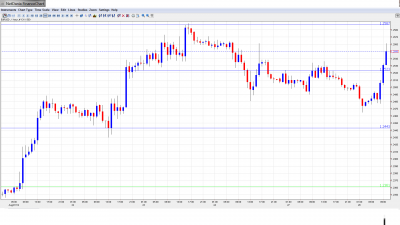After limited losses yesterday (Aug. 27th), EUR/USD is climbing, following a German Consumer Climate release which beat the market estimate. As well, Euro-zone M3 Money Supply posted its best numbers in over three years. However, the markets are disappointed after inconclusive talks which Greek PM Samaras held with Chancellor Merkel and President Hollande late last week, and this sentiment could weigh on the euro. Today’s key release in the US is CB Consumer Confidence.
Here’s an update about technical lines, fundamental indicators and sentiment regarding EUR/USD.
EUR/USD Technical
- Asian session: Euro/dollar dropped to 1.2466, and then consolidated at 1.2488. The pair has gained in the European session, climbing above the 1.25 line.
- Current range: 1.2520 to 1.2587.
Further levels in both directions:
- Below: 1.2520, 1.2440, 1.24, 1.2360, 1.2330, 1.2250, 1.22, 1.2144, 1.2043, 1.20, 1.1876 and 1.17.
- Above: 1.2587, 1.2623, 1.2670, 1.2743 and 1.2814.
- 1.2520 is providing weak support, 1.2440 is stronger.
- Uptrend support is currently very far.
- 1.2587 is the next line of resistance.
Euro/Dollar rises following strong Euro-zone, German data – click on the graph to enlarge.
EUR/USD Fundamentals
- 6:00 Gfk German Consumer Climate. Exp. 5.8 points. Actual 5.9 points.
- 8:00 Euro-zone M3 Money Supply. Exp. 3.3%. Actual 3.8%.
- 8:00 Euro-zone Private Loans. Exp. -0.1%. Actual +0.1%.
- 13:00 US S&P/CS Composite-20 HPI. Exp. -0.3%.
- 14:00 US CB Consumer Confidence. Exp. 65.8 points.
- 14:00 US Richmond Manufacturing Index. Exp. -11 points.
EUR/USD Sentiment
- Greece asks for more time, Germany objects: Prime Minister Antonis Samaras is seeking an extension until 2016 to meet the bailout targets. Samaras has declared that he only wants more time, not more money, while German officials have tersely responded that “more time means more money”. As part of the 130-billion euros bailout package from the EU and the International Monetary Fund (IMF), the Greek government has committed to sweeping cuts of 11.5 billion euros in 2013 and 2014. However, the Troika must give its approval before Greece can receive the next installment of 31.5-billion-euros. Talks with the troika will continue in September.
- Samaras returns home empty-handed: Greek PM Samaras met with the leaders of Germany and France last week, but failed to extract any firm promises of aid or extensions. Chancellor Merkel was very complimentary of Greek PM Samaras, but had nothing concrete to offer her Greek guest, noting that Europe was in a “decisive” phase in the debt crisis. French President Hollande stated that he wanted to see Greece remain in the zone, but said that any discussion of delays in Greek repayments could only take place after the upcoming Troika report. Meanwhile, discussions about a manageable Grexit are getting louder: this time from the ECB’s Jörg Assmussen, that echoed Eurogroup chief Juncker. German grumbling is growing over Greece’s request for an extension, and a senior member of the Christian Social Union, a coalition partner, said he saw Greece leaving the euro next year. Other coalition partners are dead set against providing Greece with more time or money. See how to trade the Grexit with EUR/USD.
- Spain downgrades economy: There was further bad news as Spain downgraded its economic data for 2010 and 2011. Q2 for 2012 worsened to -0.4%, and the employment situation is abysmal, with an unemployment rate of over 24%. There are reports of ongoing negotiations between Spain and its European peers regarding a formal aid request. The Spanish government wants the ECB to resume purchasing government bonds on the open market. The ECB, however, is under pressure to provide a helping hand only if Spain accepts new conditions by formally requesting help from Euro-zone bailout funds. Spain is due to repay over 30 billion euros in October, so expect some agreement to be hammered out very shortly.
- QE3 excitement dissipates: After the euphoria from dovish meeting minutes, doubts began to rise. FOMC member James Bullard said that markets are overpricing the chance of QE3, and went as far as saying that the minutes are already stale. Indeed, the Fed discussed other options and the economy has been improving since then. Even the weak manufacturing sector has seen a positive sign: Markit’s initial PMI for August was better than July’s. There are numerous reasons why QE is far from certain in September. Will Fed chief Bernanke will be speaking at Jackson Hole later this week. Will he have any surprises up his sleeve?
- Markets hopeful over ECB cap: Following German media reports, speculation is rife that the ECB intends to cap peripheral Euro-zone bond yields, perhaps as early as September. The process could look like this: After Spain finally submits its request for aid, the ECB will buy bonds en masse, and will defend a preset yield like the SNB defends the EUR/CHF floor. Such a strong commitment will likely calm investors, as long as the ECB doesn’t have seniority. For its part, the ECB has denied the reports, calling them “absolutely misleading”. Despite the ECB denial, the euro has improved, and Spanish bond yields have dropped below the 7% level.

